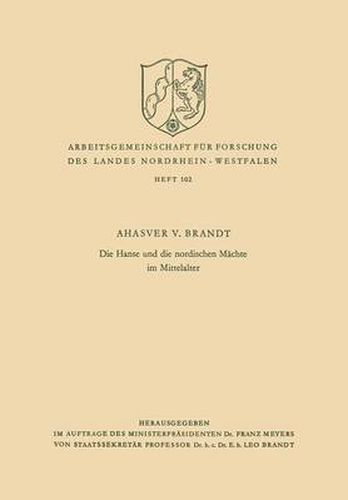Readings Newsletter
Become a Readings Member to make your shopping experience even easier.
Sign in or sign up for free!
You’re not far away from qualifying for FREE standard shipping within Australia
You’ve qualified for FREE standard shipping within Australia
The cart is loading…






This title is printed to order. This book may have been self-published. If so, we cannot guarantee the quality of the content. In the main most books will have gone through the editing process however some may not. We therefore suggest that you be aware of this before ordering this book. If in doubt check either the author or publisher’s details as we are unable to accept any returns unless they are faulty. Please contact us if you have any questions.
In order to evaluate the relationship of the Hansa to the Nordic powers accurately, it must first be stated that the Hansa was not a firm federation but only a free community of interest. In the power politics of the North of Europe, therefore, it was not the Hanseatic League as such, but usually in- dividual towns or groups of towns from this great community which ap- peared as active factors. Further, one should not forget that the interests of the Hansa towns were for the most part of a social and economic nature: they were not interested in national power politics. This is consistent with the fact that the most important political opponents of the Hansa towns were not the foreign powers of the North, but the North German dynastie princedoms, which represented the greatest threat to their constitutional and economic freedom. Political processes in the Hanseatic-North European dis- trict in the Middle Ages were therefore influenced less by national than by social and economic motives. The case is similar in the Nordic kingdoms of the Middle Ages. Here also it is a question rather of power complexes mainly determined through social and economic interests, than of closed national units. The political and economic disputes of the Middle Ages in the Baltic Sea area have as yet no national character.
$9.00 standard shipping within Australia
FREE standard shipping within Australia for orders over $100.00
Express & International shipping calculated at checkout
This title is printed to order. This book may have been self-published. If so, we cannot guarantee the quality of the content. In the main most books will have gone through the editing process however some may not. We therefore suggest that you be aware of this before ordering this book. If in doubt check either the author or publisher’s details as we are unable to accept any returns unless they are faulty. Please contact us if you have any questions.
In order to evaluate the relationship of the Hansa to the Nordic powers accurately, it must first be stated that the Hansa was not a firm federation but only a free community of interest. In the power politics of the North of Europe, therefore, it was not the Hanseatic League as such, but usually in- dividual towns or groups of towns from this great community which ap- peared as active factors. Further, one should not forget that the interests of the Hansa towns were for the most part of a social and economic nature: they were not interested in national power politics. This is consistent with the fact that the most important political opponents of the Hansa towns were not the foreign powers of the North, but the North German dynastie princedoms, which represented the greatest threat to their constitutional and economic freedom. Political processes in the Hanseatic-North European dis- trict in the Middle Ages were therefore influenced less by national than by social and economic motives. The case is similar in the Nordic kingdoms of the Middle Ages. Here also it is a question rather of power complexes mainly determined through social and economic interests, than of closed national units. The political and economic disputes of the Middle Ages in the Baltic Sea area have as yet no national character.